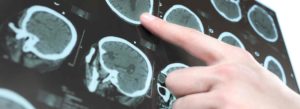
Stroke is the third deadly disease after heart and cancer. Stroke is a brain attack that arises suddenly where there is a partial or complete impairment of brain function as a result of disruption of blood flow due to blockage or rupture of blood vessels in the brain, causing brain cells to lack blood, oxygen or food substances and eventually can there were deaths in these cells in a relatively short time.
Stroke can cause temporary or permanent damage, depending from how long the blood flow disrupts and the part of brain is damaged. Seizures, immobile, difficult to speak or swallow, memory loss, the emotional, and the pain are complications that usually occur after a stroke. For example, if the stroke damages the right part of the brain, the ability to move and the left sensory sensation can interfere. Right brain damage also causes disruption of the ability to speak.
Many risk factors that can cause a stroke. Included in this are obesity, consumption of alcohol, using cocaine and methamphetamine, smoking, and lack of exercise. Those who have a high blood pressure, a high cholesterol, a diabetes, a cardiovascular disease or a disturbing sleep problem also have a high risk of having a stroke. Unfortunately, people still often ignore the control of high blood pressure or hypertension which is a risk factor that dominates the occurrence of stroke.
Handle ischemic strokes (strokes caused by blockages or blockages in the blood vessels of the brain in certain areas so that areas of the brain that are stagnant by blood do not get energy and oxygen supply, so that eventually the brain cells in the area die and no longer function) professional medical workers working to restore the blood flow as soon as possible following standard treatment procedures, including administration of aspirin or Tissue Plasminogen Activator or TPA which is a clot-busting drug. In some cases, the catheter is needed to remove clots that block blood flow.
Whereas in dealing with hemorrhagic strokes (damage or swelling in the brain due to rupture of blood vessels in or near the brain), doctors will try to control the bleeding with an anti-platelet drugs or also through surgery to repair leaking blood vessels, and sufferers most likely need rehabilitation to restore physical ability and speech.
Study Findings: Impact of Marijuana on Stroke
Marijuana has shown effective in limiting the cell damage and also providing nerve protection that occurs after ischemic disorders such as stroke. This benefit is caused by the presence of one of the chemical compounds in cannabis, cannabidiol (CBD). The administration of CBD shortly after stroke has proven to protect nerve cells and astrocytes from the damage, and leads to a functional, a histological, a biochemical and a recovery of nerve function. If you want know more about marijuana, you can see at Medical Marijuana Canada.
The results of research showing CBD as a protective nerve cell are found in animal studies. Piglets given CBD shortly after an ischemic attack can restore brain electrical activity to 46.6{072d47b0fec2f1df7b41e1e9d3c86cec7c90c1c2eaa080351dda79a8607086b6} of the average and only 4 of 8 spasms, compared to piglets who were not given CBD, who only recovered about 20.5{072d47b0fec2f1df7b41e1e9d3c86cec7c90c1c2eaa080351dda79a8607086b6} of decreased electrical activity in their brain and all experience cruelty. CBD is able to reduce both effects by more than 50{072d47b0fec2f1df7b41e1e9d3c86cec7c90c1c2eaa080351dda79a8607086b6}.
Research in mice, CBD shows its ability to reduce infarct volume and acute brain damage and apoptosis when given shortly after ischemic attack. Only one study showed that the administration of CBD before and after a stroke resulted in strong nerve protection. If you want to do the treatment by CBD, you should contact the Medical Cannabis Canada.
Brain damage that occurs after a stroke is associated with increased a pathological process in which the nerve cells are damaged and killed with excessive the stimulation by neurotransmitters like glutamate and the similar substances or called excitotoxicity, oxidative stress and swelling. However, the administration of CBD shortly after a stroke has occurred to effectively prevent these three problems from occurring.
The discovery of neuroprotection also occurs in humans. Giving cannabinoids to humans shortly after a stroke can cause a decrease in infarct volume and encourage recovery in damaged areas of the brain and the area then shows good functional improvement after a stroke.
Research shows that administration of cannabinoids shortly after a stroke has occurred that can speed up recovery clearly and limit damage. An animal study found that therapy for giving CBD repeatedly for 3 days after a stroke had caused an increase in recovery and improved rat defense. When CBD is given 5 days after a stroke occurs, it does not appear to affect ischemic damage.